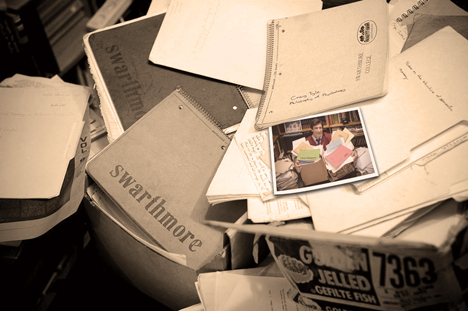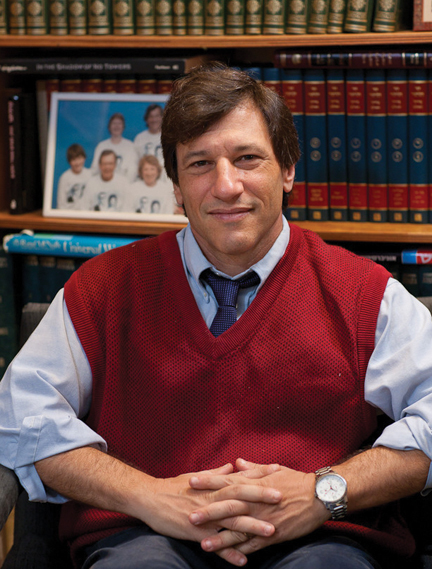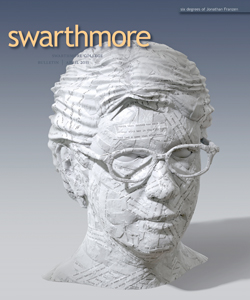28 Years Untouched
On Sorting Through My College Papers
 AFTER GRADUATION IN MAY 1982, I rented a U-Haul, filled it with my stuff, and unloaded the cartons in my parents’ basement. Weeks later, I flew to Jerusalem to play in a rock-and-roll band and study Arabic—and from there to Egypt, Algeria, Tunisia, Morocco, and Ethiopia on a Watson Fellowship. At the end of the Watson year, I returned to the States to hire a shipper to move my cartons and guitars to the kibbutz in Israel where I’d decided to live.
AFTER GRADUATION IN MAY 1982, I rented a U-Haul, filled it with my stuff, and unloaded the cartons in my parents’ basement. Weeks later, I flew to Jerusalem to play in a rock-and-roll band and study Arabic—and from there to Egypt, Algeria, Tunisia, Morocco, and Ethiopia on a Watson Fellowship. At the end of the Watson year, I returned to the States to hire a shipper to move my cartons and guitars to the kibbutz in Israel where I’d decided to live.
Not long after the shipping container arrived, I was drafted into the Israeli Army. After I was discharged, my new wife Susan and I took off to motor across America on our honeymoon. By the time we came back, we’d decided to quit the kibbutz for Tel Aviv, where I was to start graduate studies and she medical school. Only days after finishing my dissertation—and a day before Susan finished her internship—we had our daughter Dara.
Soon, we moved to Boston for four years of postdoc fellowships for me and residency for Susan. Three weeks before we returned to Israel, our son Micha was born. And so it was that two big cartons, hastily packed during Senior Week at Swarthmore in 1982, remained untouched until late 2010 when, fulfilling a very old promise to Susan, I resolved to sort through their contents. I found myself slicing through the browned, brittle packing tape I’d bought in the campus bookstore in Parrish Hall basement and confronting all that I had saved from seven semesters of Swarthmore.
MY FIRST IMPRESSIONS WERE SENSUAL. The physicality of the papers—their very stuff—was familiar and foreign at once. My senior thesis had been typed on the campus mainframe computer and printed on great swaths of green and white striped tractor paper, of which some untrimmed pages remained. Carbon copies of each of my honors exams—what I had used to prepare in the brief interregnum between the written and oral portions of the test—were neatly stapled stacks of thin yellow paper covered with blue type. Old photocopies were slightly oily, slimy, and curled. On some, the type had turned sepia, the words barely legible. A good many academic essays were typescripts. Some were reproduced in blue mimeograph. I found dozens of seminar papers, many poorly typed—some carbon copies, some photocopied. Several were written in longhand. There were syllabi that reached 25 pages with annotations for the assignments and detailed questions “to keep in mind while reading.” Among the papers were dozens of notes, reminders, and announcements, folded in half, with my name written on the back above the letters “CM,” which only after puzzled minutes I remembered stood for “campus mail.”
Soon the sensual enchantments of these old things gave way to nostalgia. As I sat on the bedroom floor and read copies of seminar papers by people I recognized as one-time friends—and some I recognized as people who had never quite been friends. I was pricked by memories of familiar turns of phrase and attitude at once smart and smart-ass.
Craig Tyle ’82, a congenial cynic who devoted much of his senior year to writing a radio soap opera of thick and intricate intrigue and after Swarthmore went to Harvard Law and became a stunningly successful finance genius, titled his paper on Herbert Dreyfus’ What Computers Can’t Do, “What Dreyfus Can’t Do,” referring to the great artificial intelligence pioneer gamely as “Mr. Dreyfus” throughout his rattling critique. Reading those four typed pages from Oct. 21, 1981, the crispness of Tyle’s intelligence—always just this side of mocking but filled with bonhomie—is alive and brisk and inviting.
Such pangs of nostalgia were followed by an odd shock of recognition. In a spiral notebook marked “film,” I discovered a scribbled quotation of T. Kaori Kitao, the art historian who taught us about movies: “In a way, even bad movies today are good; there’s a level of artistry and technical excellence in every film that makes it to a movie theater.” Only days ago, camped before our TV playing a DVD, I had plagiarized this idea, offering it to my 11-year-old son as homespun wisdom.
 There was more. I found that the first six weeks of Rich Schuldenfrei’s syllabus for philosophy of science was very nearly the same as the first month and a half of a syllabus I later wrote for a graduate seminar in science studies that I now teach. I also found a photocopy of the same chapter of Robert Merton’s 1933 dissertation on the Protestant origins of modern science that I had taught the week before. In a roundtable at a think tank I’m helping to get off the ground—just last Thursday—I cited a paper called “Operant Psychology as Factory Psychology” by Barry Schwartz, Rich Schuldenfrei, and Hugh Lacey. Asked for the reference, I admitted I had no idea how to find the essay. A copy of it was at the top of the second carton. And reading over my own hastily composed honors exams, filled with typos and hatched with cross-outs, I came across sentences that, through some alchemy, had reappeared in papers I’d written only recently.
There was more. I found that the first six weeks of Rich Schuldenfrei’s syllabus for philosophy of science was very nearly the same as the first month and a half of a syllabus I later wrote for a graduate seminar in science studies that I now teach. I also found a photocopy of the same chapter of Robert Merton’s 1933 dissertation on the Protestant origins of modern science that I had taught the week before. In a roundtable at a think tank I’m helping to get off the ground—just last Thursday—I cited a paper called “Operant Psychology as Factory Psychology” by Barry Schwartz, Rich Schuldenfrei, and Hugh Lacey. Asked for the reference, I admitted I had no idea how to find the essay. A copy of it was at the top of the second carton. And reading over my own hastily composed honors exams, filled with typos and hatched with cross-outs, I came across sentences that, through some alchemy, had reappeared in papers I’d written only recently.
Taken on their own, these coincidences are uncanny, but they also point toward something deeper. Alongside family, my time is stretched now between teaching the history and philosophy of science, launching the think tank, serving on city council, and my havura, or egalitarian worship community. The life that I live now—what I think, teach, and write and what I hope to accomplish—was all in those cartons. Some of what I found in the papers I had written or read 28 years ago I could now see as a crude anticipation of what I think and do today. But much of it was neither crude nor mere anticipation. Much of it was fully formed back then, or at least no less fully formed that what I am capable of today.
I know I was not a blank tablet when I arrived at college. The case can be made that all Swarthmore did was help me become a better-realized version of who I was always destined to be—and that the intervening years have done much the same. Looked at from that angle, perhaps the sharp sense of recognition that comes from sorting through my college papers is to be expected. There is something to this, but as I unpacked those cartons, I saw that this is not a full explanation.
The whole story must acknowledge that the tens of thousands of pages of books and essays that I read as an undergraduate and the hundreds of honors papers written by kids like me, and the thousands of hours of lectures I heard, and the tens of thousands of hours of talk—idle and intense—all these, it turns out, are what I’ve been using, magpie-like, to make sense of my life, to make my life, ever since. There’s content to my character—and a lot of it, it turns out, was in two cartons that sat for 28 years untouched.
Noah Efron teaches in the graduate program in science, technology, and society at Bar Ilan University in Israel. He is a contributor to Counterbalance, a nonprofit educational organization working to promote public understanding of science and how the sciences relate to ethical and religious concerns. His book about religion in Israel, Trembling with Fear, is forthcoming from Basic Books.
 Email This Page
Email This Page